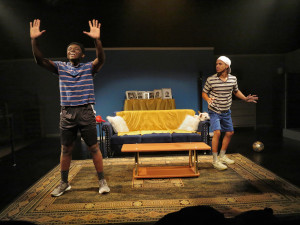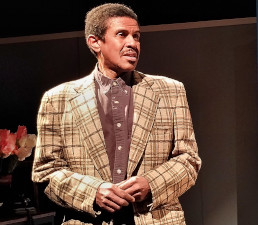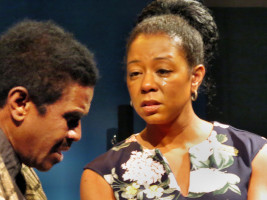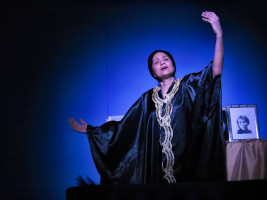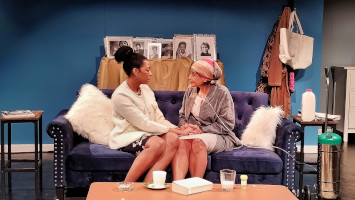
|
Beate Hein Bennett
Living in Separate Worlds “The Best Brother”
There are many internal and external circumstances that can sever family bonds--divorce, discord, cultural divergences, convictions, ambitions and life-style choices. These various causes of conflict are underlying Victor Vauban Júnior ’s play about the lives of two brothers: Daniel, the older brother and Paulo, his younger brother by two years. After their parents’ divorce, the father takes Daniel back to Angola, his country of origin, while Paulo stays with the mother in Harlem. Twenty eventful years pass before the two brothers meet each other again.
The dramatic structure of the play in this production centers on the critical encounter of the two who have become totally estranged adults after twenty years of living with a literal ocean in between and utterly different life experiences. Flashbacks provide some background starting with their common childhood in Harlem in the 1980s when they were close and aspired to be soccer stars (a la Pele!) while supporting each other through the violent fights between their parents. In a monologue Daniel reveals how he lived with his father, a fighter with the Unita forces in the long civil wars in Angola (1975-2002); after his father’s death in the wars he moved to Johannesburg, South Africa from where he ultimately has made his way back to New York in search of his family. In another flashback, we see the rebellious 17 year old Paulo, now in full transvestite mode, and his broken alcoholic mother engage in a formidable battle of convictions —the mother’s fundamental religious creed prohibits her from accepting her son’s conversion into transgender existence while Paulo is determined to fulfill his elemental desire to be a woman. In the flashback scene of her mother dying from cancer the conflict has mutated into a loving relationship as Paulette takes cares of her mother. The central confrontation between the two siblings, now adult brother and sister, revolves around Daniel’s virulent resistance to accept Paulo as Paulette-- his strict religious creed and male chauvinistic upbringing where the roles of men and women are strictly defined blinds him to the possibility.
In an earlier draft of the play the playwright had included more detail about the parents. The father and mother are shown in a fierce fight in which the mother, Alberta Montenegro, tries to assert her right to go for a singing audition—she aspires to become an opera singer—while the father, Louia, adamantly (and physically) restrains her from going out at all—he is the man in the house who decides what the woman can and cannot do. In the present production the violence between the parents is merely alluded to in the first scene between the two boys as they play soccer—in slow motion with strobe lighting—and talk about the violent battles between their parents that they’re privy to. The father’s background as an immigrant from Angola pursuing an education in the US (New York) and the terrible civil war in Angola that he had left is left largely untouched as a source of conflict in the text of the play. Instead the present production plays a lengthy barely audible historical video loop with interviews and scenes from the war as the audience enters the theater. The current play-script limits the focus on the transgender issue affecting the sibling relationship. The resolution for re-establishing the fundamental link in the blood relationship between the siblings lies ultimately in recovering unconditional love, even after long separation, no matter the differences in personality, aspirations, or life experiences.
Playwright-Director Victor Vauban Júnior together with Assistant Director Lola Lukas has created an imaginative work of intimate theater with an ensemble of actors whose performances are sensitive and clear in intent. The very first appearance of young Daniel (Obi Nwako) and young Paulo (Caleb Streety) sets the parameter of the “agon” between the two: they vie with each other as soccer players in a choreographed dance that is executed by the actors to operatic music in elaborate precise slow-motion with strobe light effect. The first word uttered is a loud triumphant “GOAL” shouted by Daniel as Paulo collapses on the floor, followed by verbal jousts between the two brothers and some hints at the perpetual parental conflicts. The adult Daniel is played by Victor Vauban Júnior at first with thoughtful reserve as he steps out of the darkness, suitcase in hand, and explains to the audience why he has come to New York after many years to find his family. He rings the doorbell and encounters a tall young woman, whom he does not recognize as his brother Paulo since he has turned into a she.
Paulette, now a poised self-possessed young woman, is played by Siobhan Crystal Alexander who shimmers with all the colors that feelings of joy, pain, insecurity, fear, and need for acceptance bring forth. The mother Alberta Montenegro played by Yvette Quintero in the flashbacks shows a woman who descends into the isolation of an ill alcoholic bereft of her dreams. In the flashback scene with her 17 year old Paulo played with superb sass and touching pathos by Jessica Roberts, Ms. Quintero puts up a desperate fight simultaneously rejecting and holding on to Paulo as her son. The production is supported by Alexander Bartenieff’s excellent lighting design with the collaboration of multi-tasking Victor Vauban and the costume design by Everett “Mr.Magic” Clark.
The play gives credence to the cliché “blood is thicker than water” as the struggle to come to an understanding within a family and especially between the two siblings ultimately resolves in mutual acceptance. It is a positive message for our chilly times of seemingly irreconcilable unbridgeable social conflicts. Couldn’t (or shouldn’t) we be “our brothers’ and sisters’ keepers”? |
| recordings | coupons | publications | classified |
